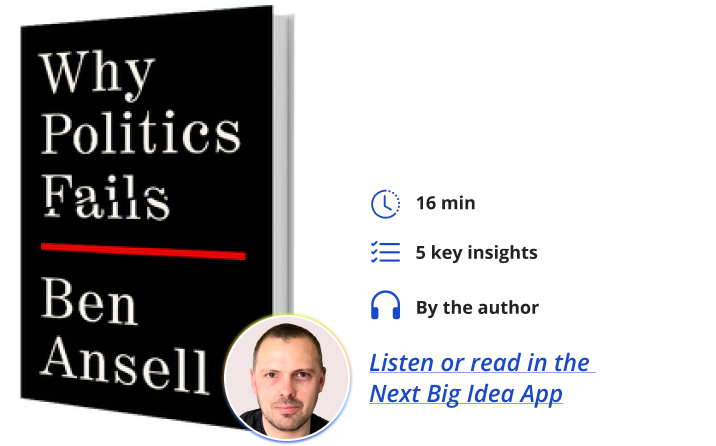Ben Ansell is Professor of Comparative Democratic Institutions at Nuffield College, University of Oxford. Born in California, he grew up in the UK before returning to the U.S. for his postgraduate studies in political science at UC Berkeley, followed by a Ph.D. at Harvard. He taught for several years at the University of Minnesota, becoming a full Professor at Oxford in 2013. He was made Fellow of the British Academy in 2018. His work has been widely covered in the media, including the New York Times, The Economist, BBC Radio, and the World Bank’s Economic Development Report.
Below, Ben shares five key insights from his new book, Why Politics Fails. Listen to the audio version—read by Ben himself—in the Next Big Idea App.

1. The Democracy Trap
The democracy trap is that there is no such thing as the will of the people. Unless we all agree on everything—and we usually don’t—we have to find ways of managing our disagreement. Why is that? Let me begin by describing what happens if we insist everyone agrees.
The most famous example is the Sejm, the Polish–Lithuanian parliament of the 17th and 18th centuries. The Sejm had a rule called the “liberum veto” which translates as “I freely oppose.” During any legislative session, any single member of the parliament could stand up and denounce any ongoing legislation and that would bring it to an end. By the 18th century, over a third of parliamentary sessions enacted no legislation at all, and foreign powers would bribe Polish parliamentarians to use their veto and derail legislation.
The liberum veto undermined an already fragile Poland, beset by rival powers on every side. In 1793, under duress, it signed away around half of its land to Russia and Prussia, the very countries that had manipulated Poland’s legislators and undermined the parliament through the liberum veto. Insisting everyone agreed had terminated an independent people. We can’t insist everyone agrees, but when we disagree we find ourselves falling into chaos or polarization.
Chaos happens because when we have more than two people and more than two things to vote over—which is practically always—there is no way to guarantee that there is a true collective preference. This is a mathematical rule, called Arrow’s Impossibility Theorem. This theorem suggests that we sometimes end up spiraling around without being able to make any final decision.
Towards the end of 2011, Belgium managed to take this to a new extreme. For 589 days, the country lacked an elected government at all. During this time students had held an underpants-only protest rally and various celebrities, from politicians to actors, recommended that men go on a shaving strike, or that female politicians go on a sex strike. The whole country seemed to be in a fever dream.
Polarization is the opposite problem. In this case, we avoid chaos but replace it with animosity, sometimes even violence. American politics has become increasingly polarized over the past few decades. We see it when Congress cannot pass bills to raise the debt ceiling, in polls where voters say they wouldn’t want their children marrying a member of the opposite party, and we see it in the refusal to accept the outcomes of elections themselves.
2. The Equality Trap
The equality trap is that equal rights and equal outcomes undermine each other. America—the land of equal political freedoms—has also become far more unequal in economic outcomes over the past half-century.
In the 1970s America’s richest one percent of earners brought in 11 percent of national income. By 2014 that had doubled to 20 percent. By contrast, the poorest 50 percent of Americans saw their share of income almost halve.
“Politics in America seems to have failed: it has underpinned, rather than undercut, inequality.”
How did America get this way? Why wasn’t there a successful political backlash to skyrocketing inequality? No matter how wealthy the one percent are, it should be impossible for them to defeat the bottom 50 percent in a democratic election. Yet politics in America seems to have failed: it has underpinned, rather than undercut, inequality.
America has become caught in the equality trap. The equal freedoms Americans cherish have made it hard to clamp down on unequal outcomes.
The wealthiest, like the rest of us, have equal economic rights to choose how to spend their money, where to live, and how to behave. This makes it hard to tax them if we want to equalize outcomes. Facing a tax on their wealth, billionaires could choose to spend down that wealth, madly frittering their money away on mansions, rocket ships, and hair transplants—or by funding political campaigns against a wealth tax.
Indeed, the ability of the wealthy to get what they want is a function of the equal rights they have under democracy to lobby and cajole. Since the Citizens United court case, American millionaires and billionaires have had the right, along with the means, to fund political advertising with minimal restrictions.
In fact, worldwide, rich people are often the biggest beneficiaries of democracy because democracies are so much better at protecting their property rights and their rights to free speech than authoritarian countries. Being a billionaire in China or Russia is dangerous territory. You can find yourself expropriated, arrested, or, well, not alive anymore.
The political power of the masses in democracies doesn’t translate into despoiling the rich. Quite the opposite: democracies protect, as well as tax, wealth. This leaves us in a quandary—we cherish our equal rights, but they often go hand in hand with soaring inequality.
3. The Solidarity Trap
The solidarity trap is that we only care about solidarity when we need it ourselves. We’d all like others to look after us when we’re ill, unemployed, or old. We just don’t really want to pay for other people going through tough times.
The challenges of health reform in America are a classic example of the solidarity trap. Somehow the United States has ended up spending more public money on healthcare while covering fewer people than other countries. In 2010, the United States government spent almost $4,000 per person per year on healthcare—more than Canada, France, Germany, Sweden, and the United Kingdom. But all those countries covered 100 percent of their residents. By contrast, in America over 18 percent of people were uninsured: forty-eight million citizens.
And this was just public money. The total amount spent per person in the American healthcare system was just under $8,000. The public spending that failed to cover a fifth of Americans was still less than one in two dollars spent on health in America.
“Somehow the United States has ended up spending more public money on healthcare while covering fewer people than other countries.”
But even a pretty modest reform to this system—the Affordable Care Act, better known as Obamacare—was massively controversial. That’s because it can be hard for us to have solidarity across time and across people. It’s also hard to have solidarity across time. It’s hard for present, healthy me to protect future sick me. Obamacare tried to resolve the solidarity trap by compelling people to buy health insurance. This was called the individual mandate, and it was unpopular. People who were currently well thought, “I’m healthy. I won’t get sick. Why should I be forced to buy this insurance I don’t need?”
What’s more in diverse societies like America, it can sometimes be harder to create solidarity across people. Obamacare became infected with America’s often volatile racial politics. When the civil rights hero Congressman John Lewis walked to the Capitol to pass the Affordable Care Act, he and his colleagues were called racial slurs by opposing crowds. Solidarity from one American to another was hard to find.
4. The Security Trap
The security trap is that we can’t avoid anarchy without risking tyranny. If no one is protecting us, then we have to spend all of our time looking over our shoulders to make sure we’re safe. We have to trust others whom we might not be able to trust. We live in anarchy. But if we are being protected, any force powerful enough to protect us is also powerful enough to control us. That then tips us into tyranny.
We all went through this trade-off in a very personal way during the COVID-19 lockdowns. States were compelled to restrict our freedoms to prevent the disease from spreading. But they often overstepped the mark.
In Wuhan, China, the city where the virus first emerged, the balance of order fell decidedly on the side of the police. The most striking image was of government workers welding shut the doors of a Wuhan apartment complex, forcing residents to stay in their flats. Wuhanese citizens were allowed out only once every three days, one person at a time. To check into the hospital, you had to be approved by a neighborhood committee. Across the city, large yellow barricades divided buildings and neighborhoods from one another.
On their smartphones, citizens seeking to pass checkpoints had to present a QR code to a police scanner. The public could be controlled forcibly at the gates of their apartment complexes by uniformed agents of the state. Or they could be controlled invisibly through code.
By contrast in the United States, each state set lockdown rules according to its local politics. That meant that the “laboratory of democracy”—as America’s loose form of federalism is often called—faced the risk of a lab accident.
“If we are being protected, any force powerful enough to protect us is also powerful enough to control us.”
South Dakota’s governor, Kristi Noem, argued that South Dakotans could be trusted to manage their own risks. South Dakota’s massive Sturgis motorcycle rally went ahead as normal in August 2021. But by September, the New York Times was featuring stories about participants who had been killed by the virus just weeks later. By early November, the number of weekly new cases was over 1.5 percent of the state’s population. Wide-open prairies and personal responsibility alone were no shield. Treating people “like adults” hadn’t stopped them from becoming patients. Anarchy, like tyranny, had its costs.
5. The Prosperity Trap
The prosperity trap is what makes us richer in the short run but makes us poorer over the long haul. Temptations now can distract us from making investments that will pay off in the future. As anyone who has given up their gym membership will know.
The starkest trade-off of all is the challenge of climate change. To slow down global temperature rises, each country must be willing to accept short-term costs even though the benefits may only come decades in the future.
To reduce global emissions, we have to bring everyone on board. Slowing down emissions is costly. It’s not just the cost of producing solar panels or wind turbines. Whole industries, not least the fossil fuel sector, need to be fundamentally transformed or, more likely, shut down. That means making sacrifices by consigning coal miners to unemployment or decommissioning factories.
But unless every country does this, it may be all for naught. After all, if everyone else is pursuing net zero, I might be tempted to guzzle gas, knowing my effect on the global climate will be negligible. If everyone started to think like that, emissions would rise uncontrollably. Climate change is the greatest collective-action problem of all.
Our experience with climate change treaties shows how strong these motivations are. Countries around the world signed the 1997 Kyoto Accord but when push came to shove, they decided the costs were too hard to bear. America signed it but never ratified it, Canada left it when its oil production became too lucrative to forgo. We’re not doomed, however, as the Paris Accord of 2015 has been much more successful.
To listen to the audio version read by author Ben Ansell, download the Next Big Idea App today:
































